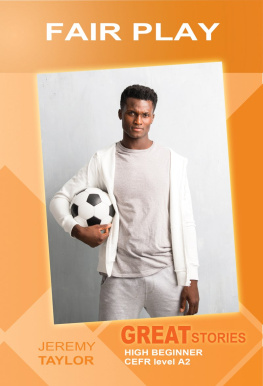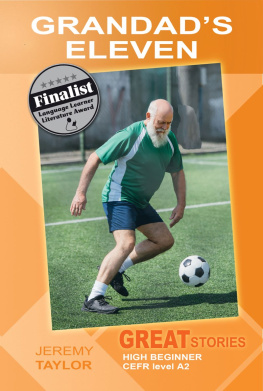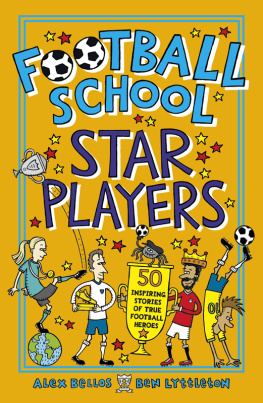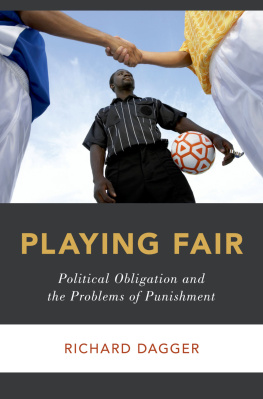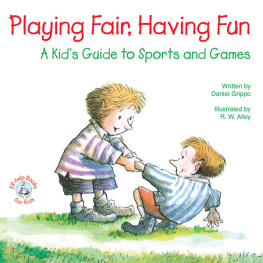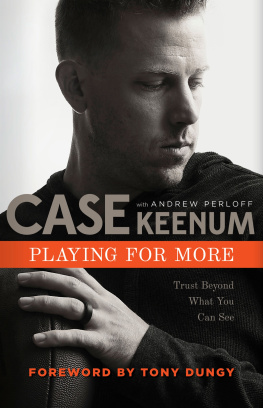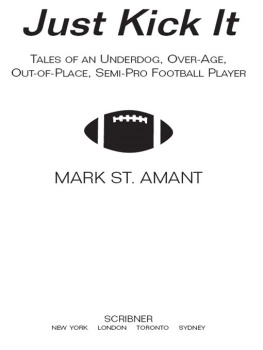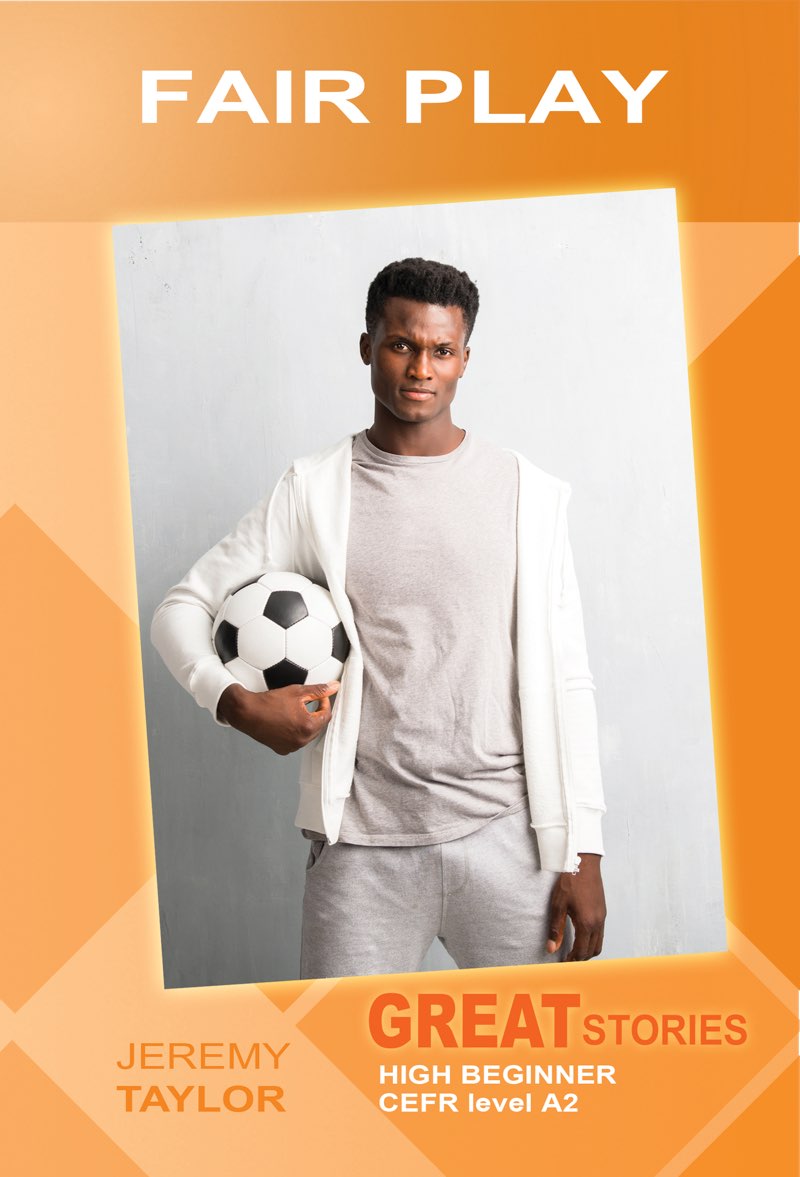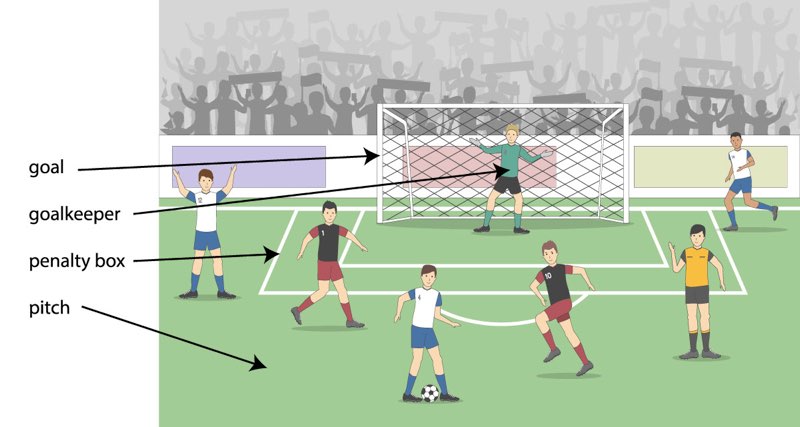All rights reserved.
No part of this book may be reproduced in any form or by any electronic or mechanical means, including information storage and retrieval systems, without written permission from the author, except for the use of brief quotations in a book review.
Before You Read
Vocabulary Notes
This book is for beginning-level readers. Almost all the vocabulary is at the A2 level. However, some intermediate vocabulary is used too.
You can learn these words before you read, or you can check this section again while you read. You can also use a dictionary while you read, or guess what words mean by thinking about the rest of the sentence. However, we recommend reading through the example sentences and notes below before beginning the book, no matter what vocabulary strategy you use.
Sports Vocabulary
This book is about the sport of football (also called soccer in American English). Here is some vocabulary used in football.
a goal: A goal can be two things. It is the area at both ends of the football pitch (see the picture). It is also the word for kicking the ball into that areawe say a player scores a goal if they kick it (or head it) into the goal.
a free kick A free kick happens when one team does something wrong. For example, when Team A does something wrong, like a player touches the ball with their hand or kicks a player from Team B, then Team B gets a free kick. The players from Team A must stand ten metres away while Team B kicks the ball at the goal.
a penalty A penalty kick is similar to a free kick, but it happens when one team does something wrong inside the penalty box (see the picture). If Team A does something wrong near their own goal, Team B gets a free kick from eleven metres away from the goal, and only the goalkeeper from Team A can try to stop the ball.
goalkeeper The goalkeeper is the only player who can touch the ball with their hands. Goalkeepers defend the goal for their team. They try to stop the ball from going into the goal. Goalkeepers can only use their hands near their goal.
referee A referee watches the game to see that the players play correctly. If the players do something wrong, the referee blows a whistle to stop the game. A referee can decide if a player gets a penalty for doing something wrong.
to send off If a player does something very bad, then the referee can send them off. They have to leave the pitch, and their team has to play with only ten players.
Reading Notes: Football
Football is one the worlds most popular sports. There are 11 players on each team. A football match is played on a football pitch, or field. A football match lasts 90 minutes. The idea of the game is to get the ball into the other teams goal. Normally people try to kick the ball into the goal, but players can also head the ball (hit it with their head). When a team kicks the ball into the goal, they score one point. Score is also nounwe say the score is two one (2-1), or the score is one nil (1-0). In football, nil is another word for zero.
Every four years, there is a big competition with many teams from different countries. This competition is called the World Cup. The teams play many games to decide which team is the best.
Discussion Questions
- You often see or hear the words fair play at football games and with other sports. What do you think it means?
- Do you think its necessary to have a referee at football games? Why or why not? Are referees always fair?
- Would you talk to an older person who was alone in a caf? Why or why not?
- Some old people have some interesting stories to tell. Do you know any older people? Do they tell good stories? Give an example.
Chapter One
The old man always sat in the corner of my caf. He had beautiful dark eyes. But they were sad eyes. He probably didnt have a home. Every day he came in to my caf at about half past seven. He drank one cup of tea and ate a chocolate biscuit. He always left when I close the caf at nine oclock.
But who was he? Why ws he sad? I was sure he had a story. So one day, at nine oclock, I went to his table. I sat down next to him. He looked at me and asked, Do I have to go?
No, you dont. Do you want some more tea?
I dont have any more money.
Thats okay. Ill buy this one for you. I got up and made two cups of tea. Then I returned to his table. Here we are. Two cups of lovely tea.
He smiled for the first time. I was happy about that. I dont like to see sad people. Then I looked at him again. His face I knew his face from somewhere. From a long time agoperhaps thirty years ago, when I was a young girl. Whats your name? I asked.
Me? He was surprised by my question.
Yes, you. I smiled. We were alone in the caf.
Georgie, he said.
Georgie? Wait a minute. I know that name from somewhere. You're not Georgie Goode, are you?
Thats me, said Georgie. Then he drank some tea.
I didnt believe it. Georgie Goode, the Georgie Goode, was in my caf. Georgie Goode, the football star! Georgie Goode was popular with every woman in England. He was a lot older now. His curly dark hair was mostly grey. But his eyes! His eyes were the same beautiful brown.
I had so many questions I wanted to ask Georgie. What? How? Why? When? He was once the best football player in the world. Now he was a poor old man.
I can see you have a lot of questions, he said.
Well, yes. Im interested. What happened?
Its a long story, he said.
I like long stories.
Are you sure? he asked.
My husband left me last year. I had no children. Yes, Im sure.
Georgie started to tell me his story. Okay. Nobody knows my full story. This is the first time.
I really want to hear it, Georgie. Can I call you Georgie?
Sure. And what can I call you?
Maria.
Maria. Thats a lovely name.
He smiled at me. Georgie Goode smiled at me! I am sure my face was red. He was about fifty-five, but he looked ten years older. I was thirty-five. I understood why many women loved Georgie--his smile, his eyes...
Sodo you want to hear my story?
Oh, sorry. Yes. Ill close the caf and make some more tea.
Two minutes later, I sat down again next to Georgie. Okay, Im ready.

